Vintage Treasures: The Flashing Swords! Original Anthologies, edited by Lin Carter
Paperback editions of Flashing Swords! #1-5 (Dell Books, 1973-1981).
Covers by Frank Frazetta (1 & 2), Don Maitz (3 & 4), and Richard Corben
Lin Carter is best remembered these days as the editor in charge of the Ballantine Adult Fantasy line, which was by any measure a monumental achievement, bringing back into print a truly impressive array of important fantasy books, many in serious danger of being forgotten. But Carter’s career extended beyond that. He was a very prolific author, with his best-known series being the Thongor books, with the hero a barbarian quite openly modeled on Conan.
With L. Sprague de Camp, he produced a great many “posthumous collaborations” with Robert E. Howard, featuring Conan — in stories either expanded from fragments Howard left, or new stories featuring Conan. Carter’s Callisto series is fairly derivative of Edgar Rice Burroughs. He also wrote pastiches of Lovecraft, of Dunsany, of Clark Ashton Smith. Carter was also an historian and critic of fantasy fiction, producing book length studies of Lovecraft and Tolkien, as well as Imaginary Worlds, an ambitious introduction to and history of fantasy.
And he was a prolific anthologist, putting out a number of reprint anthologies, a Year’s Best series devoted strictly to fantasy, and finally the subject of this article, the five original anthologies collectively called Flashing Swords.
[Click the images for flashing versions.]
Back covers of Flashing Swords! #1-5
Carter was born in 1920, and died in 1988, only 57, of oral cancer.
The Flashing Swords books were originated, says Carter, as a project of the Swordsmen and Sorcerer’s Guild of America, or SAGA, a somewhat informal group of writers of Sword and Sorcery. The term Sword and Sorcery was coined by Fritz Leiber in 1961, at the request of Michael Moorcock. SAGA was founded by Carter, de Camp, and John Jakes (who died just a few weeks ago, on March 11). When the Flashing Swords books were conceived in the early ’70s, the membership consisted of Carter, de Camp, Jakes, Moorcock, Leiber, Poul Anderson, Andre Norton, and Jack Vance. He calls Avram Davidson the newest SAGA member in the introduction to his story in Flashing Swords #3. Membership was by invitation, and all contributors to the Flashing Swords volumes were SAGA members.
Here are the table of contents and publishing information for each volume. All the books were published by Dell in paperback, and all but #3 had Science Fiction Book Club editions, which sometimes appeared before the Dell edition, making them the true First Editions. The subtitles were added beginning with #3. Each anthology also contained a chatty introduction by Carter, and short introductions to each story, usually discussing the author.
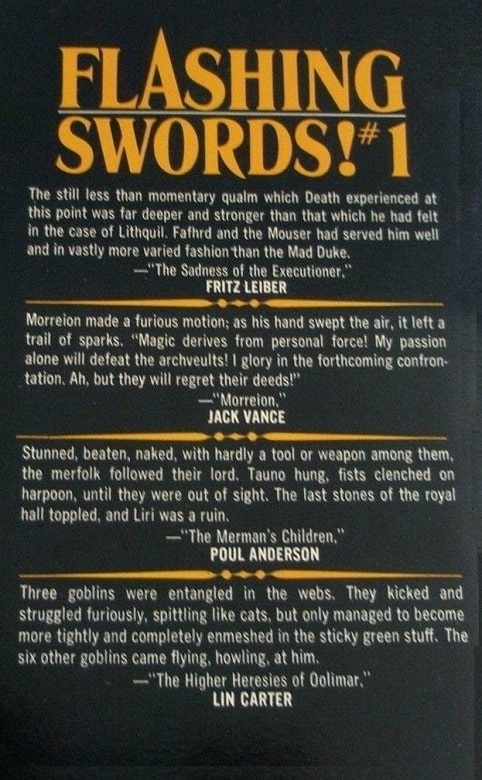 |
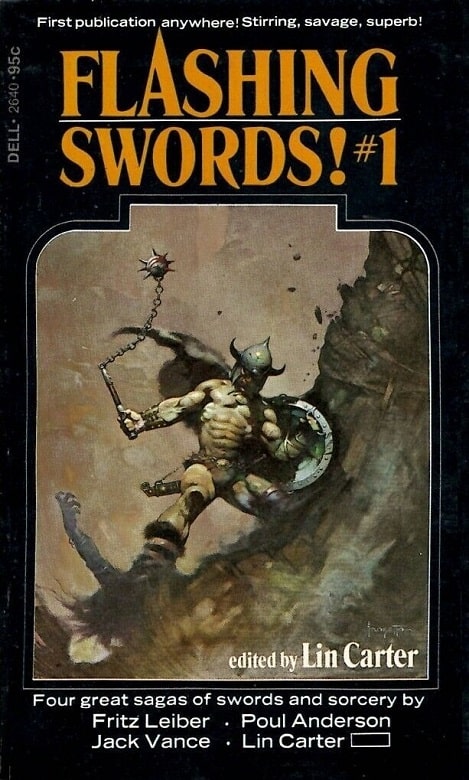 |
Flashing Swords! #1 (Dell, July 1973). Cover by Frank Frazetta
Flashing Swords! #1 (1973)
“The Sadness of the Executioner” [Fafhrd and the Gray Mouser], by Fritz Leiber (3,600 words)
“Morreion” [Dying Earth], by Jack Vance (18,200 words)
“The Merman’s Children” [The Merman’s Children], by Poul Anderson (20,200 words)
“The Higher Heresies of Oolimar” [Amalrik the Mangod], by Lin Carter (16,100 words)
Flashing Swords! #2 (Dell, April 1974). Cover by Frank Frazetta
Flashing Swords! #2 (1973)
“The Rug and the Bull” [Pusadian], by L. Sprague de Camp (13,000 words)
“The Jade Man’s Eyes” [Elric], by Michael Moorcock (16,400 words)
“Toads of Grimmerdale” [Witch World], by Andre Norton (18,700 words)
“Ghoul’s Garden” [Brak the Barbarian], by John Jakes (13,300 words)
Flashing Swords! #3: Wizards and Warriors (Dell, August 1976). Cover by Don Maitz
Flashing Swords! #3: Warriors and Wizards (1976)
“Two Yards of Dragon” [Incorporated Knight], by L. Sprague de Camp (10,500 words)
“The Frost Monstreme” [Fafhrd and the Gray Mouser], by Fritz Leiber (12,500 words)
“Spider Silk” [Witch World], by Andre Norton (15,500 words)
“The Curious Custom of the Turjan Seraad” [Amalrik the Mangod], by Lin Carter (10,000 words)
“Caravan to Illiel,” by Avram Davidson (16,100 words)
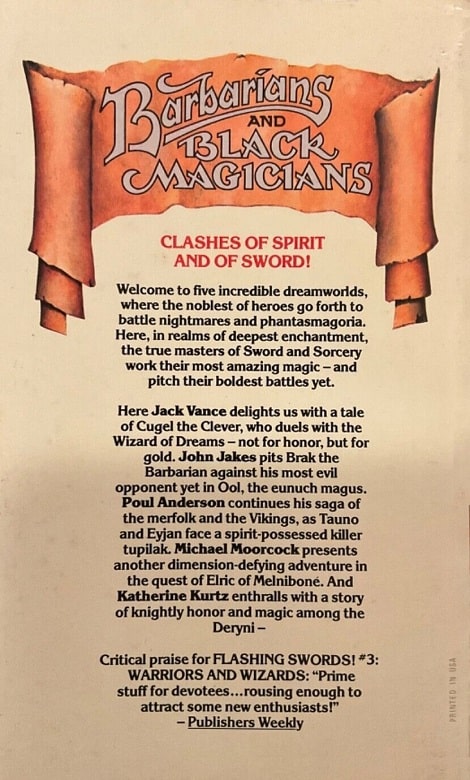 |
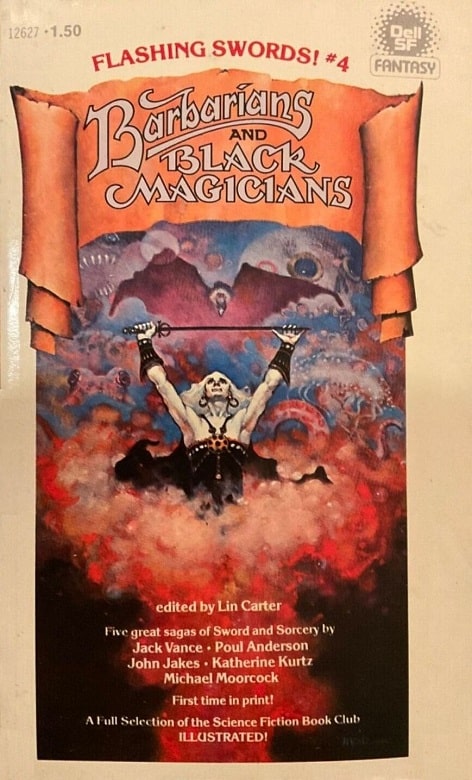 |
Flashing Swords! #4: Barbarians and Black Magicians (Dell, November 1977). Cover by Don Maitz
Flashing Swords! #4: Barbarians and Black Magicians (1977)
“The Bagful of Dreams” [Dying Earth], by Jack Vance (10,500 words)
“The Tupilak” [The Merman’s Children], by Poul Anderson (10,200 words)
“Storm in a Bottle” [Brak the Barbarian], by John Jakes (15,100 words)
“Swords Against the Marluk” [Deryni Universe], by Katherine Kurtz (10,500 words)
“The Lands Beyond the World” [Elric], by Michael Moorcock (17,500 words)
Flashing Swords! #5: Demons and Daggers (Dell, December 1981). Cover by Rich Corben
Flashing Swords! #5: Demons and Daggers (1982)
“Tower of Ice” [Dilvish], by Roger Zelazny (17,900 words)
“A Thief in Korianth,” by C. J. Cherryh (12,300 words)
“Parting Gifts” [Sirronde’s World], novelette by Diane Duane (12,300 words)
“A Dealing with Demons” [Ebenezum], by Craig Shaw Gardner (9,200 words)
“The Dry Season,” by Tanith Lee (8,200 words)
As the information in brackets, taken from the ISFDB entries, indicates, almost all the stories were parts of series. Stories noticed for awards included Moorcock’s “The Jade Man’s Eyes,” which won the 1974 British Fantasy Award for Best Short Story; Jakes’ “Ghoul’s Garden,” nominated for the same award in 1975 (don’t ask me why stories from the same book appeared on BFA awards lists in separate years); Vance’s “The Bagful of Dreams,” nominated for the World Fantasy Award for Best Short Fiction in 1978; Cherryh’s “A Thief in Korianth,” winner of the 1982 Balrog Award for Best Short Fiction; and Duane’s “A Dealing with Demons,” nominated for the same award in 1982.
Flashing Swords #1 was 11th in the Locus Poll for Best Original Anthology, and #5 was 5th in the Locus Poll for Best Anthology (the categories changed in that time frame.) Flashing Swords #3 was nominated for the World Fantasy Award for Best Anthology/Collection. All in all, a pretty respectable showing on award ballots.
As to the stories listed about as NOT being parts of series — “Caravan to Illiel,” “A Thief in Korianth,” and “The Dry Season” — I have done some more research — that is, I asked for help, and the doughty Andrew Breitenbach came through magnificently.
Both “Caravan to Illiel” and “A Thief in Korianth” were advertised by Lin Carter in his story introductions as starting new series; but neither had a companion for some time. This is hardly a surprise in the case of Avram Davidson — he started many series, and often failed to complete them. And with “Caravan to Illiel,” no further stories appeared for a decade — but then he did produce another story about Corydon, the hero of “Caravan to Illiel.” This is “The Head of Shemesh the Eshurian,” from Jessica Amanda Salmonson’s anthology Heroic Visions II (1986).
Neither story has been reprinted, though Avram Davidson’s literary executor, Seth Davis (the son of his ex-wife Grania Davis, with whom he maintained an amicable relationship throughout his life) is doing yeoman work in reprinting much of Davidson’s work (including publishing some for the first time) and I believe these stories will be in an upcoming collection.
Mayflower (UK) editions, 1974 and February 1975. Covers by the amazing Bruce Pennington
The story behind “A Thief of Korianth” is more complex. Cherryh fairly quickly used it as the basis of her novel Angel With the Sword (1984), but in so doing altered details to make it SF instead of Fantasy — part of her Alliance-Union universe. That novel, in turn, became the basis of her Shared World series of anthologies Merovingen Nights. So in a way, “A Thief of Korianth” is part of a couple of quite extensive series, but in way, it’s not, as it doesn’t quite fit into those.
However, Cherryh did eventually produce another story set in the Fantasy version of Korianth, “A Wizard of Wecsizan,” from the 2010 anthology Swords & Dark Magic, edited by Jonathan Strahan and Lou Anders. Thus “A Thief of Korianth” is at last in a series of its own, leaving Tanith Lee’s “The Dry Season” the only non-series story in the entire set of Flashing Swords books.
(I have, by the way, submitted edits to the ISFDB to create new series, named “Corydon” and “Korianth,” for those two cases.)
I have read only one of the Flashing Swords anthologies myself, though I’ve read a number of stories from the others. I’ll take a closer look at this book.
Flashing Swords #3 begins with an introduction, called “Warriors and Wizards.” In it, Carter discusses SAGA and the origins of the anthology series; and emphasizes the Fantasy (as opposed to SF) angle. He also briefly introduces each story, mostly discussing the author’s career. The TOC, by the way, presents each story as potentially part of a series, with headers like “A Fafhrd and the Gray Mouser Story” and “An Exploit from the Saga of Corydon” — as I have shown above, that clearly was a focus of the entire set of books.
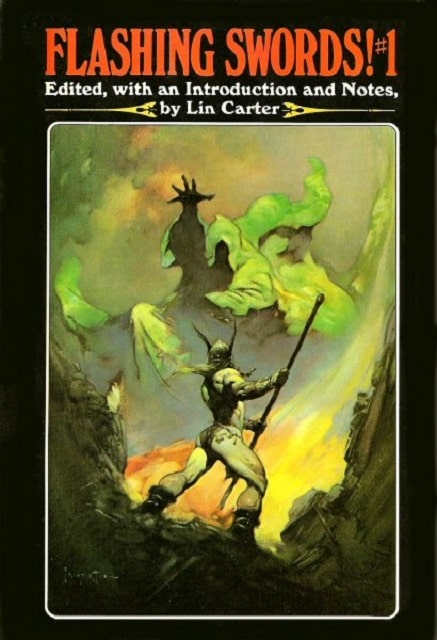 |
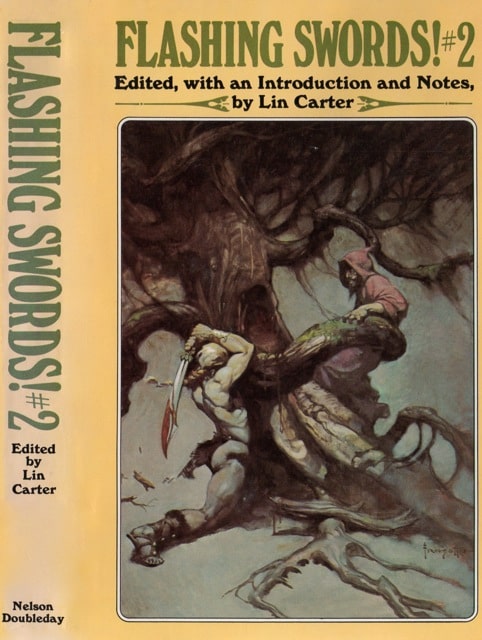 |
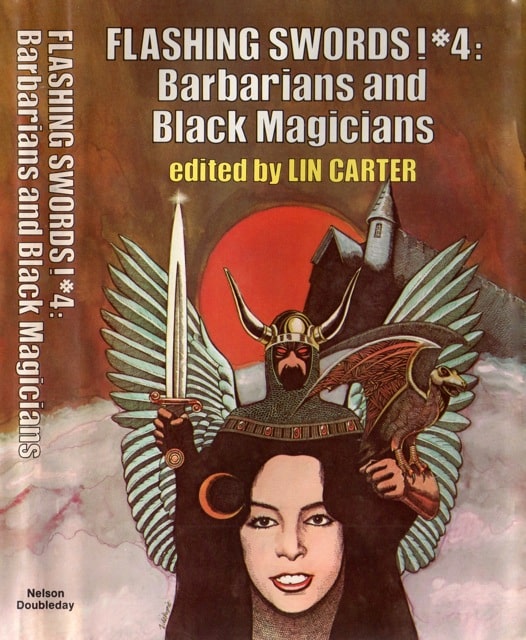 |
Science Fiction Book Club hardcover editions (April 1973, September 1973,
and May 1977). Covers by Frank Frazetta (1 & 2) and Gary Viskupic
The opening story, “Two Yards of Dragon,” by L. Sprague de Camp, concerns Eudoric Dambertson, who has a problem: there are no wars any more, and he has not been knighted as a result. Thus his suit for the hand of the enchanter Baldonius’ daughter is not going well. At last he makes a deal with Baldonius: if he can find a dragon and kill it, and bring the enchanter two square yards of dragon skin, he can marry the beautiful Lusina. He and a loyal retainer head off to distant Pathenia, a country known to have dragons. After certain misadventures, they encounter a dragon and more or less accidentally kill it. Which is only the start of their troubles — for it turns out dragons are protected in Pathenia, and Eudoric must go to prison … However, eventually his practical side takes over … and he finds a way to resolve his problems, and even take his two yards of dragon home. It’s lightly amusing and clever work.
De Camp wrote three more stories about Eudoric in short order, appearing in F&SF and The Year’s Best Fantasy. A decade later, in 1987, De Camp and his wife Catherine Crook de Camp turned those stories into a novel, The Incorporated Knight, and in 1991 they produced a sequel, The Pixilated Peeress.
Fritz Leiber’s “The Frost Monstreme” is a Fafhrd and the Gray Mouser story. Fafhrd and the Mouser are bored in Lankhmar one night, when two beautiful women show up, looking to recruit them to organize a mission to their home, Rime Isle, which is menaced by Sea Mingols and by the Ice Wizard Khahkht. There’s plenty of money on offer — surely enough to buy a ship apiece and pay a crew. And somehow the twosome convince themselves to do just that (instead of pocketing the money) and they end up separately heading to Rime Isle, each with a ship and a crew. The story mainly concerns what happens as they approach the Isle, when Khahkht’s machinations convince the two heroes that each man is betraying the other … This is a solid entry in the series, though not one of the very best.
There is an immediate sequel, a long novella called “Rime Isle,” that was serialized in David Hartwell’s sadly short-lived magazine Cosmos in two parts in 1977. The two stories together would have made a tidy novel in the 1950s, but in this case they ended up packaged with 6 shorter stories in the 1977 Ace collection Swords and Ice Magic — which continued the then standard series of books that had begun with five collections in 1968 and 1970. (Since then there have been additional shufflings and repackagings of the Fafhrd and the Gray Mouser stories.)
Science Fiction Book Club hardcover edition of Flashing Swords! #5 (December 1981). Cover by Ron Miller
“Spider Silk” is a Witch World story from Andre Norton. I confess I have for one reason or another read very little in this, doubtless Norton’s most famous series. I liked this story a good deal, though — and there was no need to know anything about the milieu. It opens in Rannock, a small town on the sea, in the polity of Estcarp, which I understand is featured in many Witch World stories. A severe storm batters the town, and many of Rannock’s men are lost at sea. Also, a blind young girl is rescued from a shipwreck. This girl, Dairine, ends up with the town’s Wise Woman, for she has some Talent. Over the years she picks up much of the Wise Woman’s knowledge, and also becomes a fine weaver. One day, as Dairine nears adulthood, a ship comes with the fabulously valuable “spider silk” — and against the Captain’s will, the ship’s crew kidnaps her and takes her to the place the spider silk weavers live, knowing they have a use for visitors — and Dairine is imprisoned but begins to learn the secrets of their weaving. And, also, a much more sinister secret of their true nature … As I said, pretty enjoyable. I don’t know if Dairine’s story was extended in other Witch World stories.
Now we come to editor Lin Carter’s contribution: “The Curious Custom of the Turjan Seraad.” This is one of two stories he wrote about a certain Amalric the Mangod — the other was “The Higher Heresies of Oolimar,” from the first Flashing Swords anthology. Amalric is a “brawny golden-bronze giant,” and his traveling companion, Ubonidus, is a scrawny magician. They are heading south but have reached the limit of their map. After an encounter with a man-eating tree, they and their flying “hlagocyte” encounter a group of nomads, who, fortunately, turn out to be friendly. The nomads are very hospitable — to a fault, as their leader, the Turjan Seraad, is compelled to offer any of his treasures that catch a guest’s eye to the guest. Amalric and Ubonidus aren’t sharp enough to realize that actually accepting these gifts might be a bad idea …
This is a good example of how important prose is to a story. The basic outlines of this piece, while nothing special, could have made an OK, if very derivative, novelette. But the writing simply ruins it. It is at times barely above “Eye of Argon” level. The attempts at humor land with a thud. And the resolution — the way our heroes escape — is just lame. Lin Carter made major contributions to the fantasy field as an editor, and even as a writer of nonfiction. But as a writer of fiction he was entirely negligible.
Dedication for Flashing Swords #2
And finally there is Avram Davidson’s “Caravan to Illiel.” Corydon opens the story living happily in Styr, able to pay for the privilege of carrying a sword thanks to a magic purse. And then the purse is stolen. For carrying the sword and failing to make the required payment, he is exiled for a year. He decides to join a caravan — and as he leaves he faces the further indignity of having his own sword confiscated … though the replacement he is given has some strange properties — disquieting but perhaps helpful.
The rest of the story concerns the trip to Illiel, and it’s mostly travelogue. Corydon makes a friend, the caravan confronts Tartars, and Pygmy Wildmen, and Gryphons, and Apes … and indeed at one point Davidson more or less chucks it up and says the rest of the trip might be tedious, so let’s skip to the end … In Illiel Corydon has one more challenge — to resist the charms of a beautiful woman looking for a Sacred Spouse.
So — an episodic story, without much of a unified plot. But it’s quite fun — why? Davidson’s prose and the dry observations thereby delivered. Also, each episode is interesting enough, with some clever dangers and reasonably clever escapes. Not major Davidson, but good work.
As I noted, Davidson did eventually write one other Corydon story, “The Head of Shemeshh the Eshurian,” and it is even better. Corydon has still not returned to Styr, and after a tryst with a willing young girl which makes her relatives angry enough to try to kill him, he flees and ends up captured by Shemesh the Eshurian — who forces him to travel to the corrupt city Cartha Cabira to retrieve Shemesh’s head, which is to be found in the Great Adyt of the Great Temple. Which is, naturally, forbidden territory. Corydon’s time in the city is well described, his way of finding the head is nicely put, and the consequences of having the head in one’s possession are interesting as well.
It’s a very good story, and I hope it (and “Caravan to Illiel”) will soon be reprinted.
[Thanks to Andrew Breitenbach and James Enge for some of the information here, and for some corrections.]
Rich Horton’s last article for us was a Retro-Review of the June 1956 issue of Infinity magazine. His website is Strange at Ecbatan. Rich has written over 200 articles for Black Gate, see them all here.
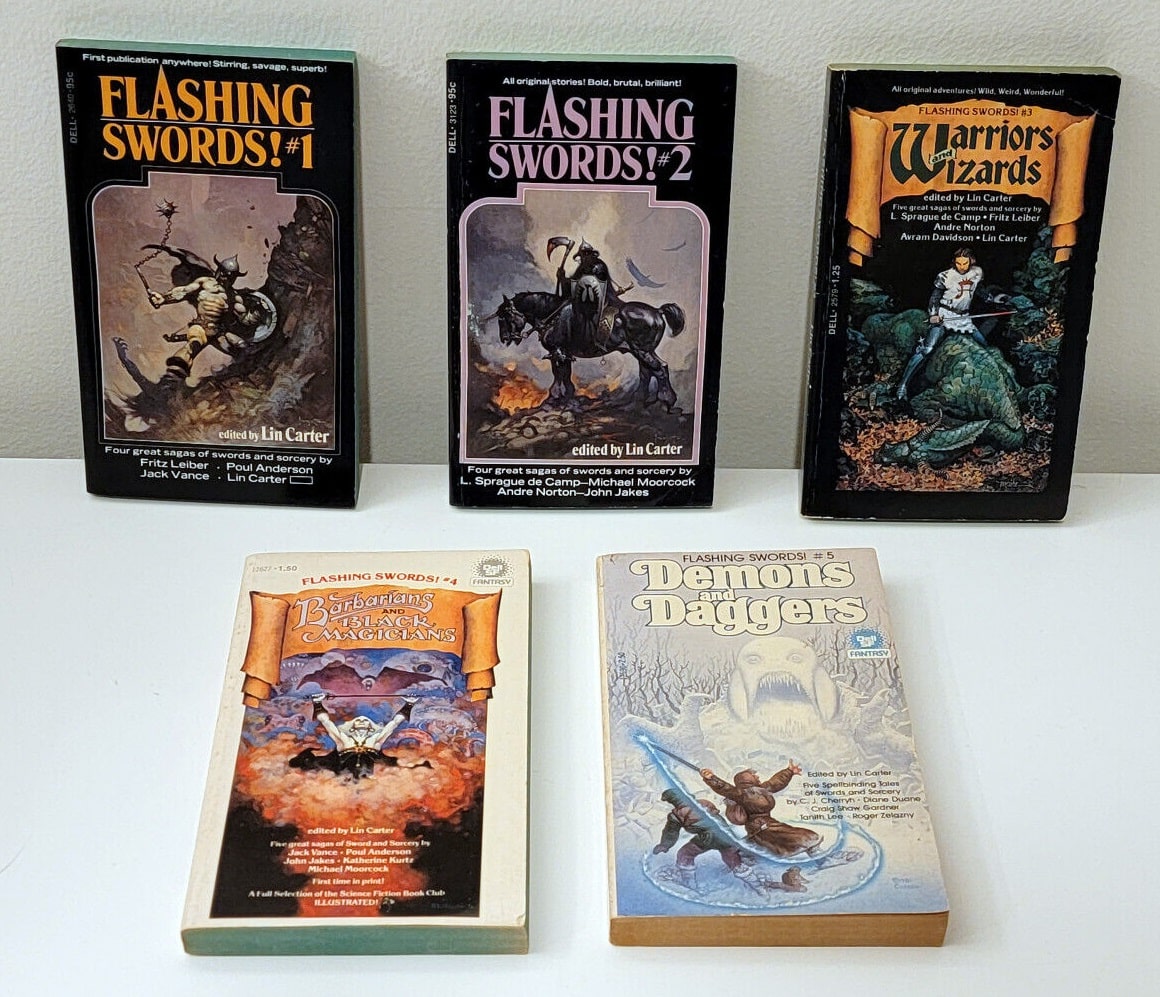
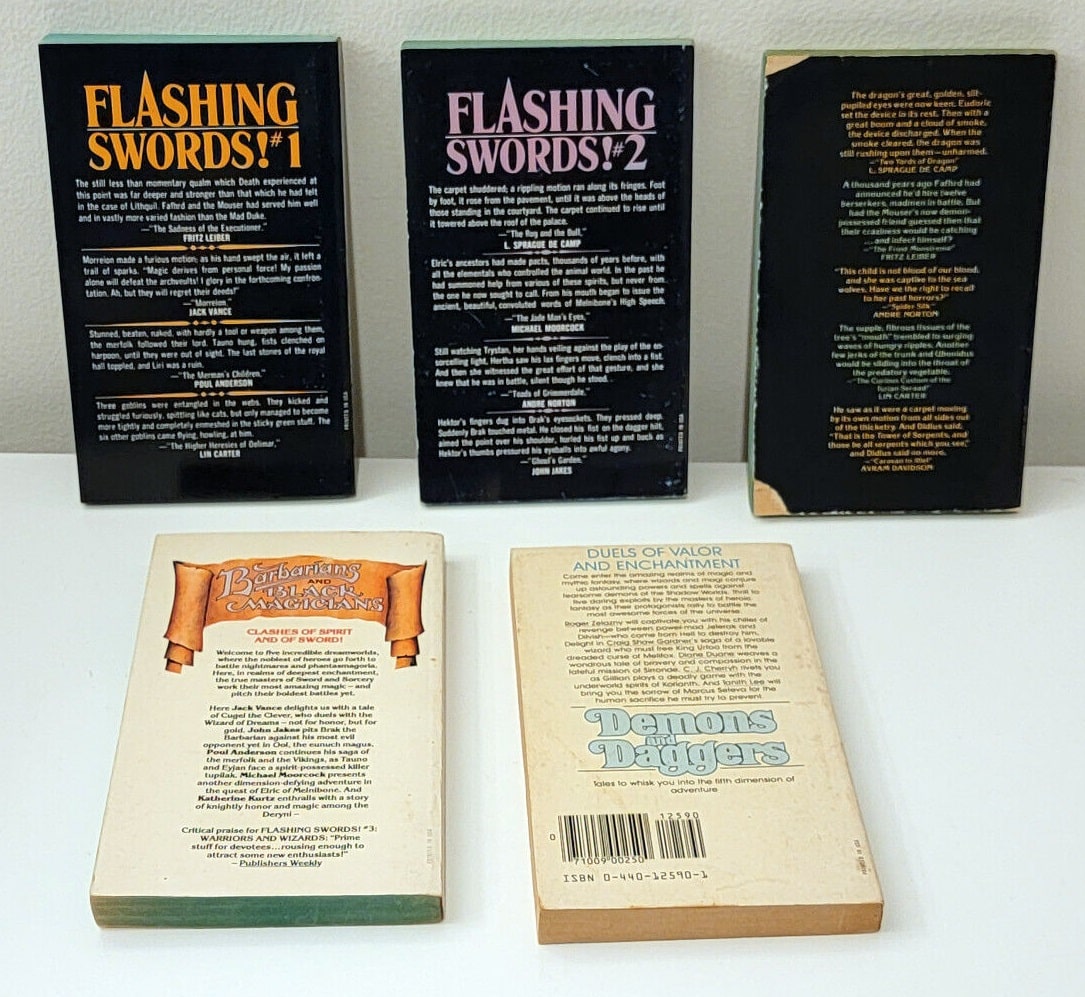
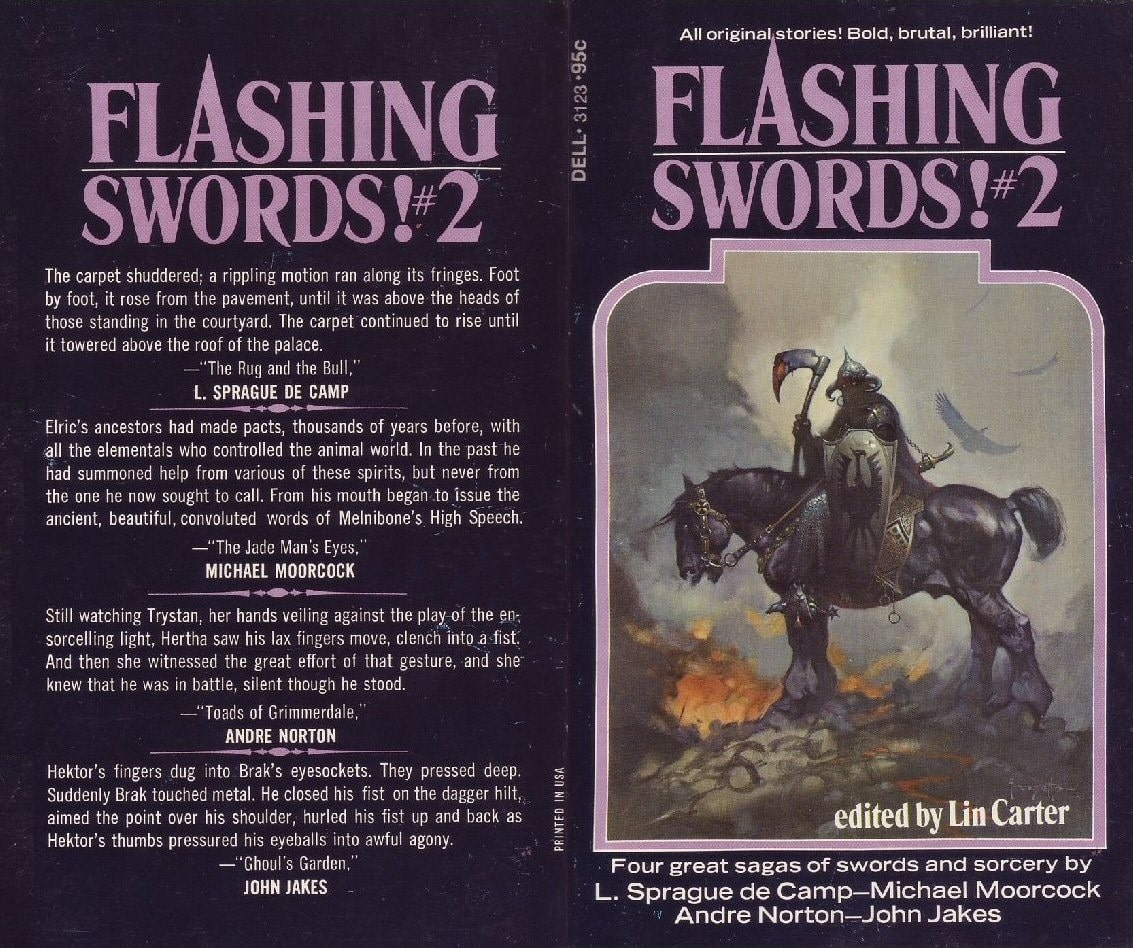
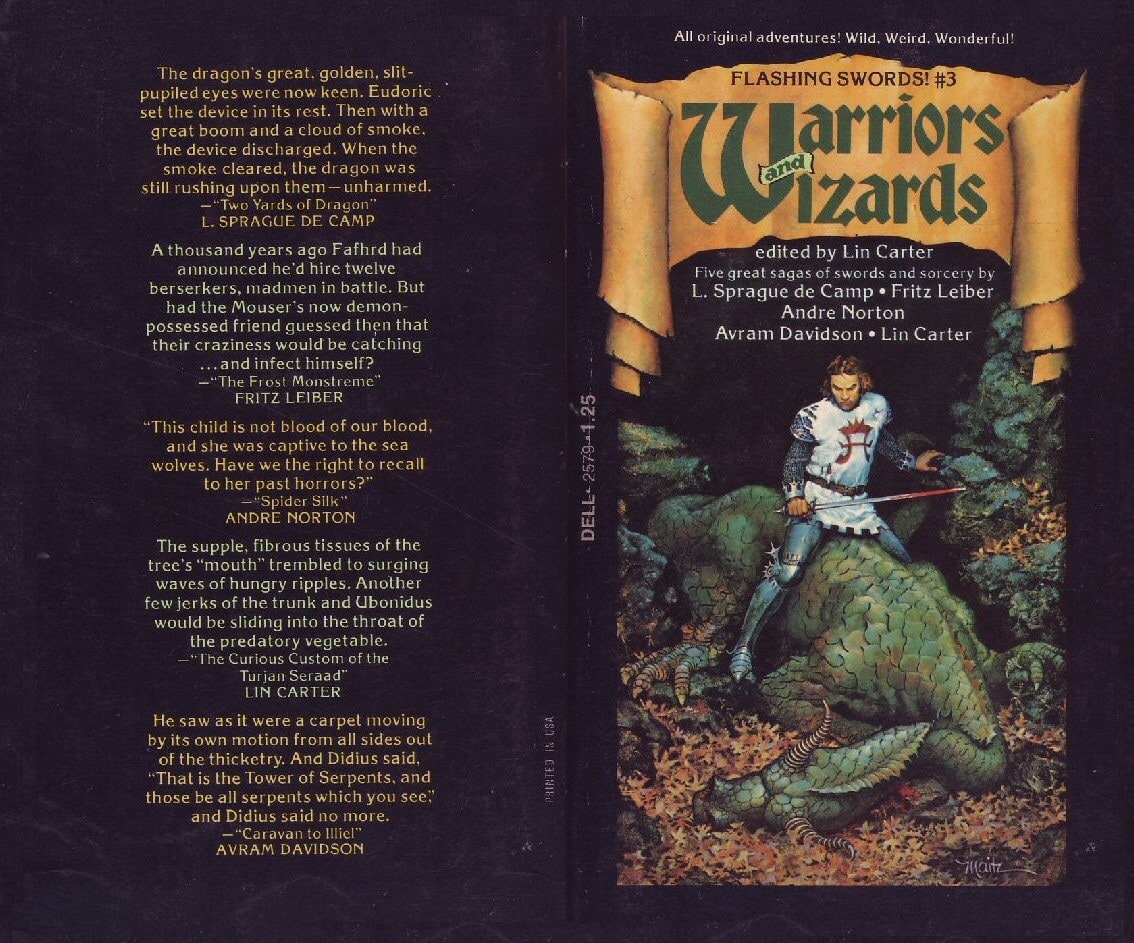
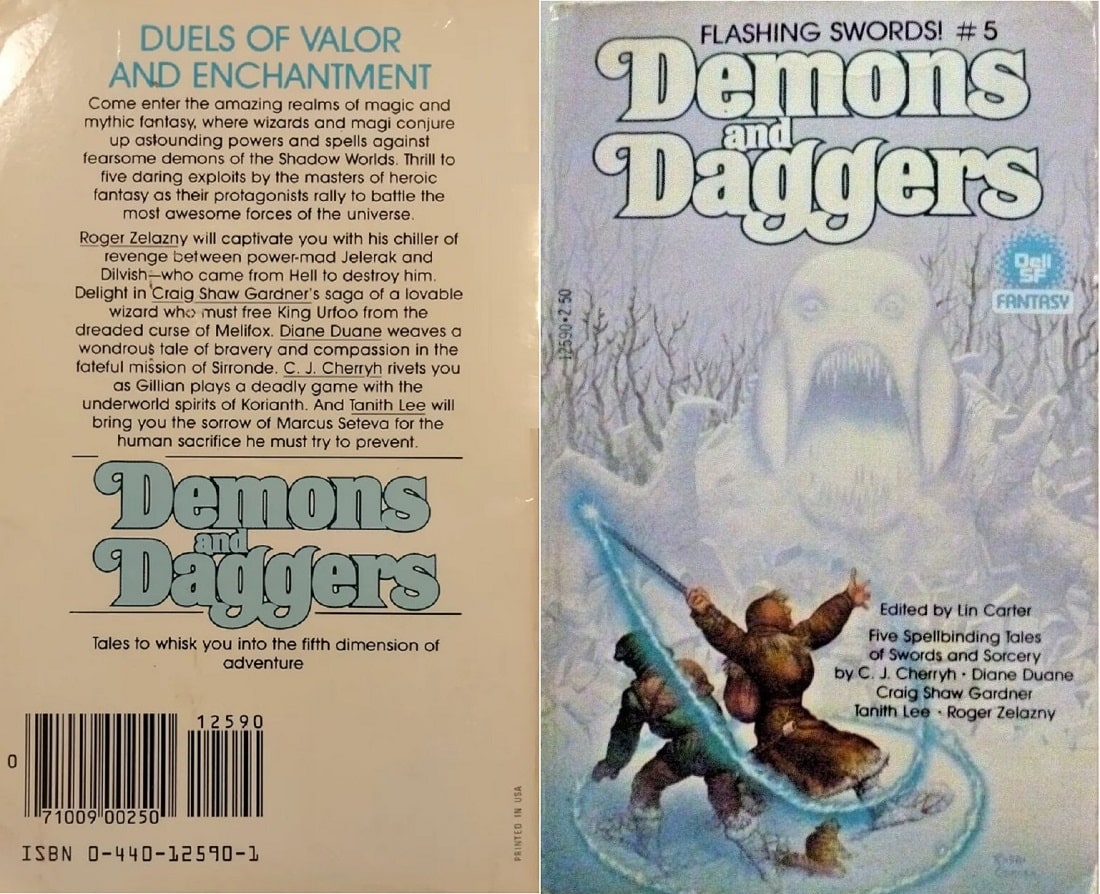
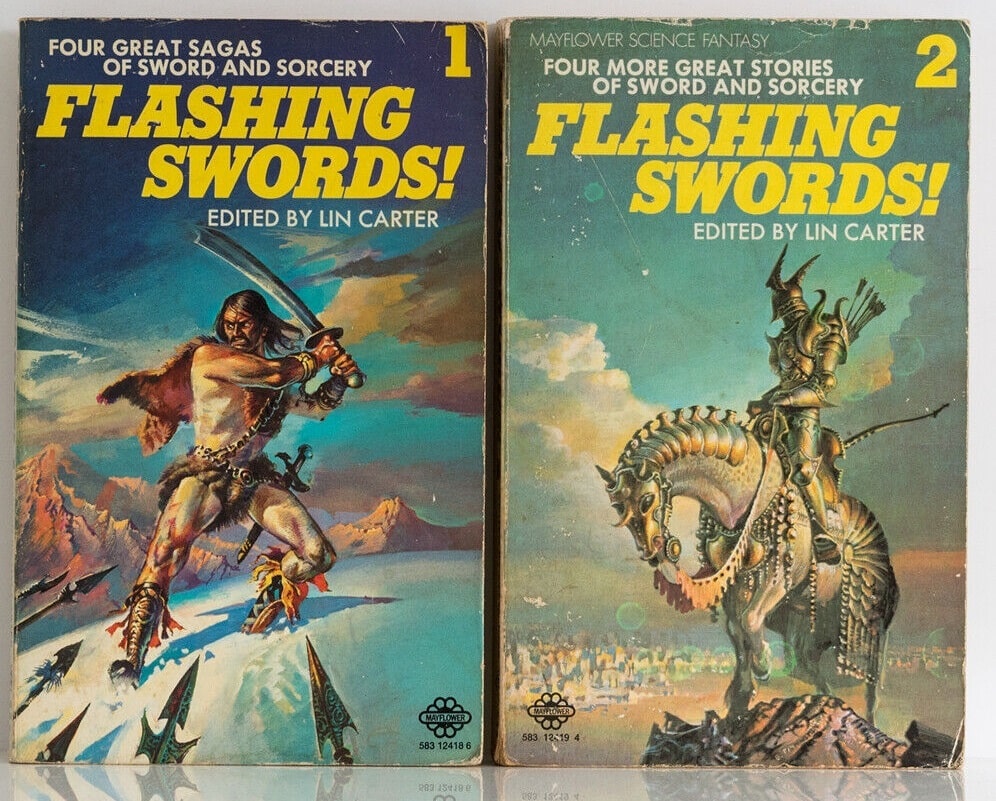
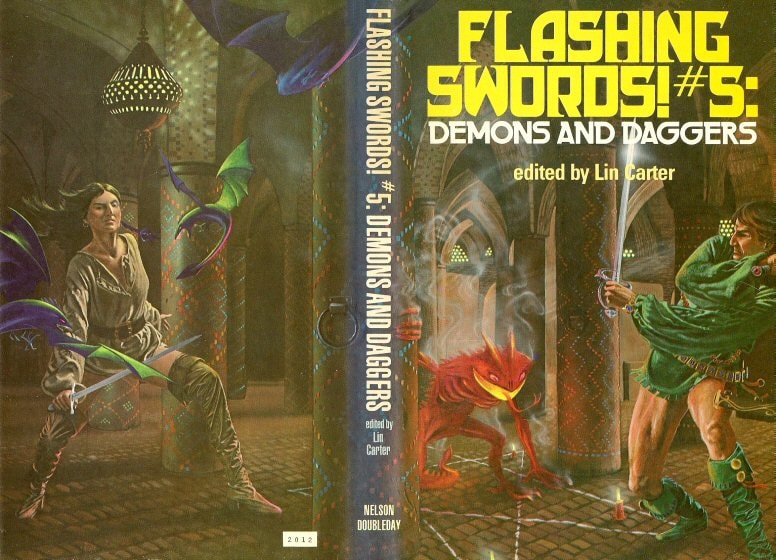
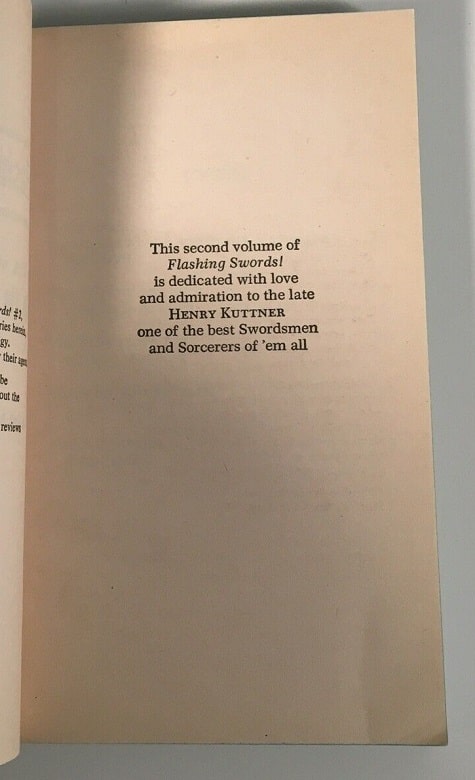
These hold honored places on my shelves, as do the BAFs that I own. I have found Carter’s own fiction to be variable, with more lows than highs. Some books, like the Zanthodon Pellucidar pastiches, never rise above paint-by-number Burroughs and are a real chore to get through; it’s almost as if he broke his models’ works into the literary equivalent of one of those footprints-on-the-floor things that supposedly show you how to tango. I did think the Merritesque (Merritish?) Green Star series was a bit livelier, and the first Thongor was pretty fun. But it is certainly true that Carter’s fiction does nothing that others don’t do much better, and has been justly forgotten – though DAW published a truckload of his novels, so someone must have been buying them.
For stories that are Sword & Slapstick, I enjoy the Amalric tales that Mr. Carter spun. They are very typically his work, with a melange of genres all smushed together (Amalric’s “guardian” sounds a lot more technological than theological, for a “man-god”). I regret he wrote but two.
And the rest of the anthologies are excellent, too, with generally evocative covers and lots of good insights (or gossip) in the story notes and forewords.
But I am flummoxed to try to remember another story that Tanith Lee wrote featuring her alternate Latin city on the Tiber of Remusa. Don’t the Cyrion stories also have/had a Remusan Empire? And Sung in Shadow, her retelling of Romeo and Juliet?
Yes, Cyrion and Sung in Shadow are both Remusan.
Thanks … I’ll look into those. Maybe “The Dry Season” counts as a series story too!
Sorry I don’t mean to be that guy but I want to double check; “Swords & Ice Magic, edited by Jonathan Strahan and Lou Anders…”. You really meant Swords and Dark Magic, right?
I’m just checking cause a really enjoyed Swords and Dark Magic and if Strahan and Ander did another Sword and Sorcery anthology, I want it.
Yes — you’re right! I think “Ice Magic” snuck in because I had looked it up to see where the Rime Isle stories were reprinted! Thanks! I’ve fixed it.
Greg,
I was the one who edited the piece, and I definitely should have caught it. My fault entirely. Thanks for the quick correction!
I have #2. I think it’s got a short afterword with Carter calling the Sword of Shanarra a huge Tolkien ripoff. He slams it hard. I remain a fan of the book to this day, and Carter can bite me.
I don’t think that highly of the S of S myself, but I do remember thinking that that was a stone that Carter (of all people!) had no right to throw.
Carter was by NO MEANS the only one to throw that stone, Bob. You can love Shannara all you want, but that doesn’t’ change the fact that it is (as I think Spider Robinson put it), “THE LORD OF THE RINGS with the serial numbers filed off.”
It would have to be #4, or even delayed #5, to have a critique of the Brooks…
I think it was actually in one of the Carter-edited Year’s Best Fantasy anthologies, not in Flashing Swords.
Makes more sense, all in all.
I love all of these anthologies. #5 is the most interesting, I think, because it shows the direction the series COULD have gone in, bringing a bunch of new authors into the fold; and A Thief in Korianth is a personal favorite of mine.
I have the first four (three in hardback) and have to search to see if I have the fifth volume. I always say that Lin Carter wasn’t the greatest writer, but he was a fantastic editor, a champion of promoting Swords and Sorcery – and probably the personality of that generation I would most wish to sit down and have a drink with.
(Also, I didn’t realize (or maybe didn’t remember) that Cherryh’s Swords & Dark Magic story was a Korianth follow-up; I’ll have to give it a reread.)
Pity these aren’t available as ebooks. The demand would definitely be there (although I imagine copyright issues would be a major headache)
That’s the challenge with pretty much any anthologies from back in the day.
Joe — yes, exactly. It’s hard enough dealing with one rights holder, let alone a dozen.
In the 1970s here in Australia we only received UK paperbacks due to trade deals done with the British decades earlier; thankfully the Mayflower UK printings of this series were among the books that arrived on our shores and that’s how I became familiar with Flashing Swords!. I still have those volumes, tucked away among my Lin Carter books. And Pennington’s covers are amazing, as you say Rich.
Carter’s career has been much discussed but I do wish to note one aspect: his work completing various King Kull stories was masterful, he really captured the essence of the character and the rhythms of Howard’s writing, in my view much more than De Camp did with Conan.
do any videos or recordings of Carter exist?
How can these be vintage if I collected them when they came out? Does that that I, too, am…nah, can’t be.
I feel your pain, Brian!
https://www.isfdb.org/cgi-bin/pl.cgi?156311 for an entry on the not terribly long but handsome Whispers Press hardcover collecting “Frost Monstreme” and “Rime Isle” as RIME ISLE…
Todd,
Thanks for the link! I don’t think I’ve ever SEEN a copy of Rime Isle, but it definitely looks relevant to my interests. Time to fire up the internet shopping machine!
Rich had noted the 2 stories would’ve made for a book by themselves Back In the Day…turns out that day was still with us in the late ’70s…oddly enough, the Nashua, NH library even bought a copy, so I could read it/look at it the time.